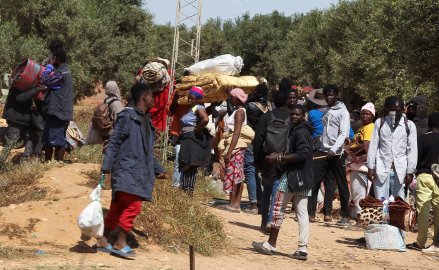Sub-Saharan Migrants in Tunisia Face Severe Poverty Crisis
Tunisia, a North African country known for its rich culture and history, has become a crucial transit point for many sub-Saharan migrants seeking better opportunities in Europe. However, the current socio-economic climate is pushing these vulnerable populations into a dire situation. The ongoing challenges faced by sub-Saharan migrants in Tunisia have led to an alarming rise in poverty levels, exacerbated by political instability, economic downturns, and restrictive migration policies.
The Struggles of Sub-Saharan Migrants
Many sub-Saharan migrants arrive in Tunisia with hopes of finding jobs and improving their living conditions. Unfortunately, they are met with numerous barriers that hinder their progress. The complex reality of their lives includes:
- Limited access to employment: The job market in Tunisia is already strained, and migrants often face discrimination, making it even more difficult to secure stable work.
- Financial instability: Without a reliable source of income, many migrants struggle to meet their basic needs, including food and shelter.
- Legal challenges: Many migrants lack proper documentation, which limits their access to services and makes them vulnerable to exploitation.
The Impact of COVID-19
The COVID-19 pandemic has further intensified the challenges faced by sub-Saharan migrants in Tunisia. With businesses closing and economies worldwide in decline, job opportunities have diminished significantly. As a result, many migrants are left without any means of support:
- Job losses: Many migrants who were working in informal sectors lost their jobs during the pandemic, leaving them with no safety net.
- Inability to send remittances: Migrants often support their families back home through remittances. The loss of income has severely affected their ability to do so.
- Healthcare access: The pandemic has strained healthcare systems, making it even harder for migrants to access necessary medical care.
Living Conditions: A Harsh Reality
The living conditions for many sub-Saharan migrants in Tunisia are harsh and often unsafe. Many reside in overcrowded shelters or makeshift housing, lacking basic amenities such as clean water and sanitation. The dire economic situation has forced many to rely on humanitarian aid, which is not always consistent or sufficient.
Some migrants have reported facing violence and discrimination from local communities, further isolating them from potential support networks. As they navigate these challenges, many experience mental health issues, including anxiety and depression, exacerbating their already precarious situation.
Humanitarian Response and Support Networks
Despite the challenges, various non-governmental organizations (NGOs) and humanitarian groups are working tirelessly to provide support to sub-Saharan migrants in Tunisia. Their efforts include:
- Providing emergency aid: Many organizations offer food, clothing, and shelter to those in need.
- Legal assistance: Some NGOs help migrants navigate the complex legal landscape, offering advice on how to obtain documentation and access services.
- Job training programs: Initiatives aimed at equipping migrants with skills needed for the job market can help them secure employment.
Call for Policy Change
The situation of sub-Saharan migrants in Tunisia calls for urgent attention and action. Advocacy for policy changes is crucial to improve their living conditions and access to services. Policymakers need to:
- Implement inclusive labor policies: Creating opportunities for migrants in the job market can help alleviate poverty and promote social integration.
- Enhance legal protections: Ensuring that migrants have access to legal rights and protections can help reduce exploitation and discrimination.
- Strengthen social services: Improved access to healthcare, education, and housing for migrants can significantly enhance their quality of life.
The Road Ahead
The plight of sub-Saharan migrants in Tunisia serves as a stark reminder of the vulnerabilities faced by marginalized communities in times of crisis. As they continue to navigate the challenges of poverty, discrimination, and legal barriers, it is essential that both local and international communities come together to support them. By addressing the root causes of their struggles and advocating for their rights, we can help create a more equitable and just society for all.
As awareness grows regarding the severe poverty crisis among sub-Saharan migrants in Tunisia, it is imperative for individuals, NGOs, and governments to take action. Only through collective efforts can we hope to alleviate the suffering of these individuals and create pathways toward a brighter future.










